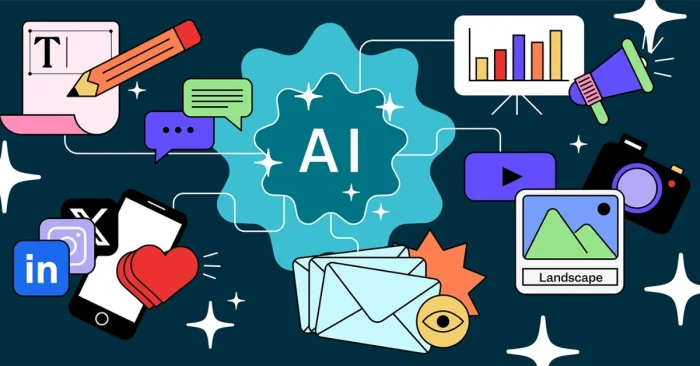Introduction to AI Marketing Tools
AI marketing tools have become essential in today’s digital-first world. These solutions use artificial intelligence to streamline marketing tasks, enhance campaign targeting, and improve overall customer engagement. By analyzing vast amounts of data, AI can provide marketers with insights that are nearly impossible to uncover manually. Businesses of all sizes, from startups to large enterprises, can benefit from these tools by reducing workload, boosting efficiency, and achieving better results with fewer resources. As competition grows, AI-powered marketing solutions are no longer optional—they are necessary for staying ahead of the curve.
Why AI Tools Are Important in Marketing
Artificial intelligence has transformed the marketing landscape by making campaigns smarter and more personalized. Traditional marketing relied heavily on guesswork and generalized strategies, but AI allows marketers to create highly targeted campaigns that resonate with individual customers. Predictive analytics, automated ad placement, and natural language processing are just a few ways AI helps businesses connect with their audience. In addition, AI marketing tools offer cost efficiency, saving brands from wasting budget on ineffective campaigns. The ability to process massive datasets ensures accurate insights, driving growth and return on investment. These advantages explain why more companies are adopting AI marketing solutions worldwide.
Benefits of Using AI in Marketing
AI marketing tools provide several key benefits that help businesses operate more efficiently and competitively. One of the biggest advantages is automation, which reduces manual work and saves time for marketing teams. Tools powered by AI can automatically optimize ad targeting, generate personalized content, and even adjust bidding strategies in real time. Another major benefit is improved customer insights. By analyzing user behavior, purchase history, and online interactions, AI can predict what customers are most likely to want. This allows businesses to deliver relevant content, boosting engagement and conversions. Furthermore, AI enables predictive analytics, allowing marketers to forecast trends and act proactively.
Top Features of AI Marketing Tools
AI marketing tools come equipped with a wide range of features designed to streamline marketing efforts and maximize results. Some of the most common include:
- Automation: AI can automate repetitive tasks like email scheduling, social media posting, and reporting.
- Predictive Analytics: Tools can forecast customer behavior and predict campaign performance.
- Content Creation: Many platforms generate text, images, and even video content using AI.
- Personalization: AI helps tailor content, product recommendations, and email campaigns to individual users.
- Ad Optimization: AI-driven platforms automatically test and optimize ad creatives, placement, and targeting.
These features collectively make marketing more effective, data-driven, and less time-consuming, helping businesses maintain a competitive advantage in a saturated marketplace.
Challenges of AI in Marketing
Despite its many advantages, implementing AI marketing tools comes with challenges. One common issue is data privacy. Customers are increasingly concerned about how their data is collected and used, and companies must comply with regulations like GDPR and CCPA. Another challenge is cost. While AI tools are powerful, they often require significant investment, which can be difficult for smaller businesses. Additionally, there is a learning curve involved, as marketing teams must adapt to new technologies and workflows. Finally, overreliance on automation can lead to reduced human creativity in marketing campaigns. Striking a balance between AI and human input is critical for success.
Top AI Marketing Tools
1. HubSpot Marketing Hub
HubSpot’s AI-powered marketing platform offers advanced tools for automation, lead management, and customer engagement. Its smart content feature helps businesses personalize content for individual users, while predictive lead scoring improves sales efficiency.
2. Jasper AI
Jasper AI specializes in content creation. It uses natural language processing to generate blog posts, social media captions, and email campaigns. This helps businesses maintain a consistent publishing schedule while saving time and costs.
3. Semrush
Semrush leverages AI to provide detailed keyword research, SEO insights, and competitor analysis. Its marketing toolkit allows businesses to optimize campaigns across multiple channels, including content, paid ads, and social media.
4. Salesforce Einstein
Salesforce Einstein is an AI-powered CRM solution that enhances customer relationship management. It predicts customer needs, automates workflows, and helps businesses deliver personalized experiences at scale.
5. Grammarly Business
Grammarly uses AI to help teams improve communication through real-time writing suggestions. For marketers, it ensures all customer-facing content is clear, error-free, and engaging, which strengthens brand credibility and trust.
Frequently Asked Questions (FAQs)
What are AI marketing tools?
AI marketing tools are software platforms that use artificial intelligence to automate tasks, analyze data, and improve marketing strategies across multiple channels.
Are AI tools suitable for small businesses?
Yes, many AI marketing tools offer affordable plans and scalable features, making them accessible for small and medium-sized businesses.
Do AI tools replace human marketers?
No, AI tools assist marketers by automating repetitive tasks and providing data-driven insights, but human creativity and strategy remain essential.
Which AI marketing tool is best?
The best tool depends on your needs. For content creation, Jasper AI is ideal, while HubSpot and Salesforce are better for automation and customer engagement.
How do AI tools improve ROI?
AI tools improve ROI by optimizing targeting, reducing ad spend waste, and delivering more personalized customer experiences that lead to higher conversions.






